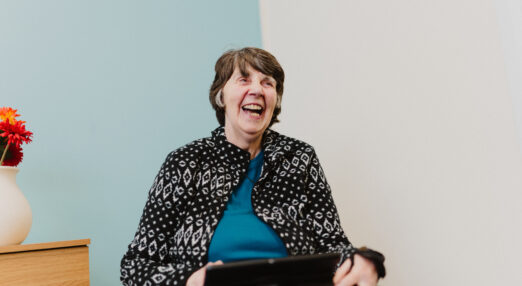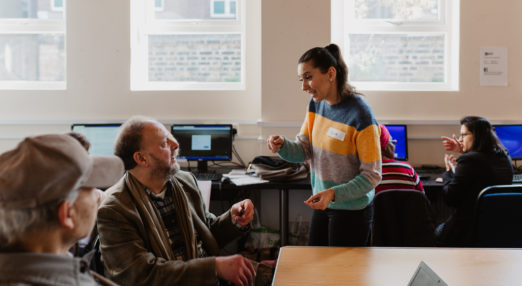Recent polling reveals the reality of the digital skills challenges faced by the UK population
Read the insights from the public polling commissioned by Virgin Media O2 which highlights how people in the UK are experiencing digital exclusion.
Recent public polling commissioned by our Strategic Partner Virgin Media O2 shines a light on the reality of digital exclusion for people in the UK. The research reveals that most people are confident using Facebook and email – but many struggle when it comes to a little bit more complicated online tasks like booking medical appointments or making a video call.
A poll of 2,000 online adults found that:
- Only 54% of people consider themselves ‘tech savvy’
- 43% feel there are so many apps, online platforms and software, they can’t keep up with them – which rises to 58% for people aged 65 or over.
- 38% said they face challenges because of their lack of tech skills
- Over 21% feel like they’re being left behind as more and more services go online
- 14% say there have been points in their lives where they could have considered themselves ‘digitally illiterate’ (despite being at least basic users of the internet)
- 26% of people said they sometimes felt embarrassed about their lack of tech ability.
- 29% of people said that not being able to use certain technologies has made them feel ‘left behind’.
- A quarter of people polled say they have to rely on YouTube tutorials if they have a tech problem they can’t resolve themselves.
- More than a third (37%) of Brits believe learning digital skills is more important than being able to read or write
- Almost a third (29%) of respondents said they had never had someone show them how to improve their digital skills.
- 2 in 10 people (20%) feel they missed out on an opportunity to learn how to do a basic online task, and feel it’s now too late to learn.
- Those with low household incomes – earning between £15,000 to £30,000 – said they’d struggle to use AI tools like Chat GPT (39%) or take part in virtual job interviews (22%), and even one in 10 aren’t comfortable using a tablet.
Despite this, almost a quarter of Brits (23%) are motivated to learn so they can improve their digital skills. This research is a stark reminder of the importance of digital inclusion services like Good Things Foundation’s free online learning platform, Learn My Way and local support like that delivered through the National Digital Inclusion Network.
We must ensure that people aren’t left behind and that we work to build a more digitally inclusive society.
*Study conducted by OnePoll between 29 September and 2 October 2023 of 2000 UK adults nationally representative on the basis of age/gender/religion.
How can I help?
Join the network
The network is made up of thousands of community partners in the UK, all working to tackle digital exclusion by delivering data, devices and digital skills training. If you’re a community organisation and you want to support your service users to access the online world, it is free to join and you’ll get access to the National Databank, the National Device Bank, Learn My Way and free training and resources.
Join the National Digital Inclusion Network
Donate devices
Are you a business that is upgrading or disposing of your corporate technology? We have a free solution that achieves each of these goals. Donate your company’s IT equipment to the National Device Bank. Powered by Good Things, the National Device Bank is an alternative solution to IT asset disposal that tackles e-waste whilst supporting people who are digitally excluded.
Donate devices to the National Device Bank
Read our policy asks
At Good Things we believe that the Government needs to take urgent action to fix the digital divide and ensure we build an inclusive digital society.
Related content
-

Urgent call to fix the UK’s digital divide
With the release of the Autumn Statement, we're calling on the Government to urgently address the digital divide.
-

Why we must work together so that everyone can get online
As Get Online Week comes to an end for another year, we reflect on the big question: how are we going to fix the digital divide? The answer...
-

Digital Inclusion: Time for Action Not Words
The House of Lord's digital exclusion inquiry rang alarm bells - but the Government's response fell flat. Our Group CEO, Helen Milner OBE, writes about our disappointment at...
